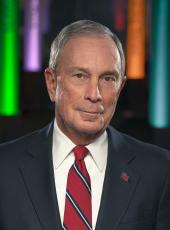Right now, the rewards of the economy are far too concentrated at the top
Read the full policy here.
NEW YORK — In case you missed it, Democratic presidential candidate Mike Bloomberg authored an op-ed today in The New York Times on his plan to fix inequality.
Mike Bloomberg: Fixing Inequality Is My Priority
But only one of us has actually raised taxes on the wealthy by persuading a Republican legislature to vote for them: Me.
When I was elected mayor of New York City, seven weeks after the terrorist attacks of Sept. 11, we faced a budget crisis and a recession. I had a choice: slash budgets and conduct mass layoffs, which would especially hurt the young, the elderly and low-income communities — or raise taxes.
So I took the politically difficult step of proposing tax increases, including one on those making more than $500,000 a year (about $700,000 in today's dollars). I persuaded a Republican-led State Senate and a Democratic-led State Assembly to pass the bill, and a Republican governor to sign it. The extra revenue — roughly $400 million per year — allowed us to invest in our future and create jobs and opportunity in the neighborhoods where they were needed most.
That is what leadership is all about: bringing people in both parties together to get results. Over my 12 years as mayor, I also helped persuade Republicans in Albany to pass marriage equality, increase funding for public schools and enact juvenile justice reforms that helped lower the number of teenagers in confinement.
I'm committed to helping Democrats win control of Congress this year, regardless of the fate of my own campaign. And if, for whatever reasons, our party falls short of controlling both chambers of Congress, the next Democratic president will have to reach across the aisle to end the Republican obstructionism that has gripped Washington for so long. That's not something that most of my fellow Democratic candidates talk much about.
Some of them prefer to shake their fists and point fingers, particularly when it comes to taxing the wealthy. I agree with the goal of making the system fairer and more progressive, including by increasing taxes on wealthy people like me. But I have a different approach, informed by my experience in both government and business.
Unlike President Trump's, I didn't inherit my wealth and I give virtually all of the company's profits to support causes I am passionate about: gun safety, climate change, women's rights, universal health care, education and yes, electing Democrats — including those in 2018 who helped create a majority in the House of Representatives, which laid the groundwork for holding this president accountable.
I believe America should always be a country where a middle-class kid like me can start a business and succeed beyond her or his wildest dreams. But just as important, America must always be a place where the middle class grows bigger and stronger. Right now that's not happening, because the rewards of the e
Part of the problem is global and macroeconomic. In nearly every industry, wages are mostly flat. Changing that will require major new investments in our public schools to make sure that all high school students graduate with the skills they need to enter college or start a career. I'll make that a top priority as president, as I did as mayor.
The tax code is also worsening inequality. We tax income from stocks and bonds at a much lower rate than income from work. We allow great wealth to pass from generation to generation with little or no tax due. And we provide countless loopholes that corporations and the rich exploit to reduce their taxes even more.
The tax plan I released on Saturday confronts these issues head-on. It reverses the Republican tax cuts for high-income individuals. It adds a 5 percent surtax on income over $5 million a year, bringing the top tax rate to 44.6 percent. It raises the corporate tax rate to 28 percent, from 21 percent, which is still competitive with other developed countries. It strengthens the minimum corporate tax on foreign income, to stop companies from moving profits overseas. And it closes loopholes that companies and individuals exploit to avoid paying taxes.
Under my plan, the tax burden on the middle class won't increase, but for those earning more than $1 million a year, capital gains will be taxed as ordinary income. This will end the unfairness of the wealthy paying far lower tax rates on investment income than working Americans pay on income from their jobs.
My plan also ends the carried interest loophole that allows money managers to categorize their ordinary income as capital gains. And it ends a huge loophole that allows the growth in the value of an estate to escape taxes at death, which benefits the wealthiest individuals.
Unlike other candidates' plans that are likely to be rejected by Congress or the courts, mine is achievable — and I will get it done. After all, who better to make the argument for raising taxes on the wealthy than me?
Some who are wealthy will call me a traitor to my class. But that's what they called Franklin and Theodore Roosevelt. Like them, I'll wear the label as a badge of honor — and I'll use the new tax revenue, an estimated $5 trillion over 10 years, to invest in America in ways that reduce inequality, strengthen the middle class and restore faith in the promise of the American dream.
Michael Bloomberg, Mike Bloomberg: Fixing Inequality Is My Priority Online by Gerhard Peters and John T. Woolley, The American Presidency Project https://www.presidency.ucsb.edu/node/364453

